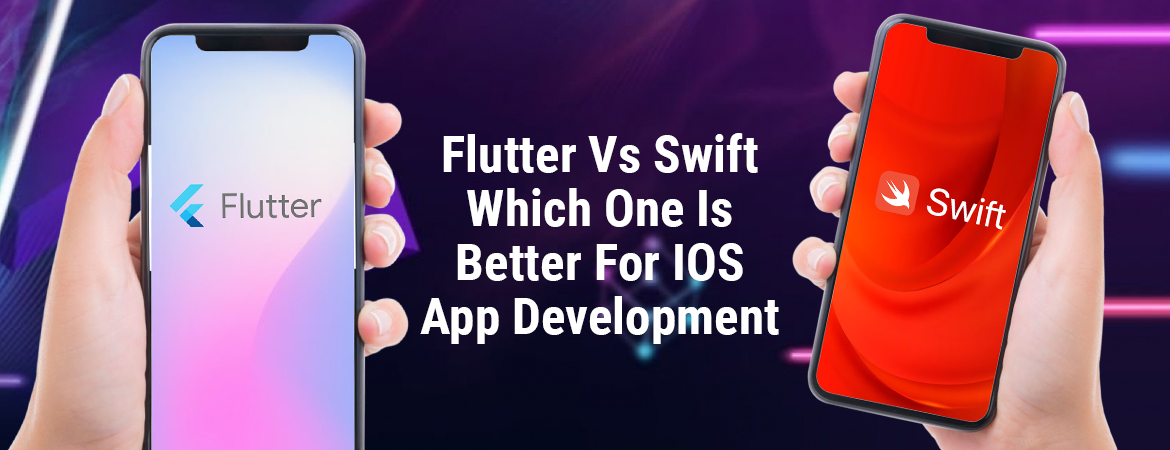
We use cookies to ensure that we give you the best experience on our website.
By using this site, you agree to our use of cookies. Find out more.
Flutter and Swift are excellent choices for building iOS apps. Swift is firmly integrated with Apple's platforms and ecosystems, which can provide access to deeper native features and optimizations. It is a good fit if you want tight platform integration or need to leverage specific iOS APIs.

The iOS app development panorama has advanced significantly in latest years. Developers now have greater picks than ever with regards to building high high-quality apps. Flutter and Swift have emerged as of the most famous alternatives for iOS development. However, deciding among those may be tough as they've distinct strengths. In this weblog, we are able to discover Flutter and Swift intensive to recognize their abilities and examine which can be a better fit in 2023. We will look at what each generation gives, their key advantages, and do a function by function comparison. By the give up, you'll be capable of make an informed decision about whether Flutter or Swift is greater appropriate in your subsequent iOS task.
Flutter is an open-supply mobile utility improvement framework created via Google. It is used to build native interfaces for Android and iOS and permits developers to apply a unmarried codebase to goal multiple structures. Flutter has a wealthy set of widgets and makes use of the programming language Dart that compiles to local ARM code throughout the build manner. Some key elements of Flutter encompass Flutter Engine that renders the UI and handles platform integration, Widgets that are the simple constructing blocks of any Flutter app and define visible factors and interactions, Hot Reload that allows immediate preview of code modifications without rebuilding the entire app, and Dart which is an object-orientated, garbage-accumulated programming language with strong typing. Flutter makes use of those underlying technology to offer rapid development cycles and a clean user revel in throughout systems.
Here are some of the key benefits of using Flutter for mobile app development:
One of the important blessings of using Flutter is that it permits for extraordinarily fast interface development. Flutter makes use of a declarative widget-based framework that makes constructing consumer interfaces truthful and intuitive. Developers can write code to describe the UI and notice the output instantly due to Flutter's warm reload function. Any modifications to the UI code like format adjustments or new widgets are shown stay in real-time without requiring a full app rebuild. This interactive experience streamlines the improvement manner and improves productivity considerably when prototyping and designing screens and flows. The speedy interface development permits focusing more at the center app common sense and functionality as opposed to losing time in rebuilding cycles.
Hot reload is a characteristic of Flutter that substantially improves the improvement revel in. It lets in builders to peer code adjustments in actual-time without stopping the app. When code modifications are made, Flutter robotically reloads the code and displays the updated UI at the going for walks app in a matter of seconds. This way builders no longer need to go out the emulator/simulator, rebuild, and restart the app after each small tweak. Hot reload cuts down the immediately remarks loop to only a hot reload which enhances productivity. Developers can recognition on the logic and UI tweaks instead of putting in and launch cycles on each run.
One of the major strengths of Flutter is that it allows building mobile apps that run seamlessly on both Android and iOS platforms from a single codebase. Developers can leverage their skills to write code once and deploy the application to multiple ecosystems without rewriting functionality for each platform. This significantly reduces time spent on development and maintenance of native apps built separately. It lowers costs for organizations as teams only need to know one technology instead of Android and iOS SDKs. Cross-platform development with Flutter simplifies build processes for multi-platform releases.
Flutter comes with robust tooling that improves developer experience and productivity. It has powerful plugins and emulators that facilitate tasks like debug profiling, testing, code editing and previewing designs. The framework also provides auto-generated UI code, routing support and reactive widgets to handle state changes efficiently. Flutter Studio installation helps set up everything seamlessly on machines along with plugins for IDEs like Android Studio, VSCode etc. Scaffolding tools offer instant project templates saving boilerplate work. Extensive tooling support shortens learning curves, streamlines workflows and enables developers to focus on core app development.
Debugging is a critical part of the mobile app development process. Flutter excels in this area by allowing developers to debug apps on iOS simulators/devices and Android emulators/devices without switching contexts. The debugger provides the same experience across platforms. Issues can be found and resolved swiftly without wasting time setting up a separate development environment for each. Hot reload also helps debug quickly by live reloading code and UI changes on the fly. Errors are clearly tracked in the debug console. Flutter's focused approach to debugging eases the process and increases productivity of developers.
Swift is a general-purpose programming language developed by Apple primarily for iOS and macOS development. Some key aspects of Swift include it being a compiled, interactive, and safe language that builds on the performance and capabilities of Objective-C. Swift code runs directly on Apple's platforms like iOS, macOS, watchOS, and tvOS for building powerful and performant native apps. Swift aims to simplify and accelerate the process of developing iOS apps by removing much of the complexity from Objective-C and replacing it with features like optionals, closures, generics and other modern language patterns. This makes writing code less error-prone and more expressive. When used for Mobile application development, Swift code can interface seamlessly with the Cocoa and Cocoa Touch frameworks while enabling building advanced interfaces, conducting networking tasks and integrating backend services effortlessly into mobile apps.

Here are some key benefits of using Swift for IOS App Development:
Swift provides excellent performance due to its compiled and optimized nature. As a compiled language, Swift code is converted to machine code during the build process, making the resulting applications very fast compared to interpreted languages like JavaScript. The compiler is able to optimize Swift code extensively which removes unused code, dead code elimination and minimizing executable size. Hence, Swift applications deliver superior speeds and responsibility. Memory management is also handled automatically through Automatic Reference Counting (ARC) which further improves efficiency. With its focus on speed, Swift allows developers to create high-performing and responsive mobile applications for iOS devices.
Safety is a major advantage of using Swift. It is designed to be a safe language that eliminates many common programming mistakes. Swift uses strong typing to catch errors early during compilation itself. This prevents bugs caused by missing types or mismatches. Features like optionals avoid runtime crashes by avoiding null references. Additional safety checks prevent unintended value conversions. Memory is managed automatically through ARC eliminating risks of memory leaks. Overall, Swift reduces possibilities of program crashes, security vulnerabilities and other bugs. This ultimately ensures applications developed in Swift are robust and less error-prone.
Apple provides developers with robust and powerful tools for writing software in Swift. At the core is Xcode - Apple's integrated development environment used to write, run, and debug Swift code. It comes with useful features like an interactive debugger, version control integration, simulator, code completion and refactoring support. These capabilities make developing applications in Swift seamless. Other tools like Swift playgrounds aid learning by allowing code to be executed interactively. The tools are well integrated with the Apple ecosystem, ensuring a stable and smooth development workflow. They also closely follow new improvements made to Swift language, keeping developers up to date.
Swift is a very versatile programming language that can be used across different platforms, far beyond just iOS development. Developers are able to use Swift to build apps not only for iOS but also macOS, watchOS and tvOS. This allows writing one codebase to target multiple Apple devices. Swift can also be utilized for server-side development using environments like SwiftNIO. Its capabilities extend to applications domains such as AI, VR and even gaming middleware development. The language continuously evolves to support emerging technologies as well. This versatility lets programmers leverage Swift in diverse projects, making it a truly multi-purpose language well-suited for a wider range of use cases.
Swift is completely open source, which means anyone can contribute to its development on GitHub. Being open source has several advantages. It allows for open collaboration from a large developer community all over the world. More programmers can identify issues, suggest new features and submit code fixes and enhancements. This participatory development model rapidly progresses the language. As Swift is open, any individual or company can freely build upon the language specification to meet their specific needs. Its open governance also ensures the project remains vendor-neutral.
While both Flutter and Swift can be used to create high-quality mobile apps, they differ in important ways. Let's compare the two frameworks across several key aspects:
| Particular | Flutter | Swift |
| Integration and Development | Flutter makes it easier to share common code across platforms since it uses a single codebase. | However, Swift is tightly integrated with Apple platforms and ecosystems. |
| Accessibility | Flutter aims to provide good accessibility support out of the box. | Apps created with Swift have deeper platform integration which can enable more accessibility features on iOS. |
| Onboarding Process | It is faster to get started with basic apps using Flutter due to its rapid hot reload capabilities. | But learning the Swift language and how Apple platforms work takes more time. |
| Performance | Flutter optimizations have reduced much of this gap. | Apps built natively with Swift often have a slight performance edge since they don't require an additional rendering engine like Flutter. |
| Development Cost | Development costs tend to be lower with Flutter since most code can be shared across platforms. | Costs are generally higher for native iOS development with Swift. |
Both Flutter and Swift mobile app development are excellent choices for building iOS apps. Swift is firmly integrated with Apple's platforms and ecosystems, which can provide access to deeper native features and optimizations. It is a good fit if you want tight platform integration or need to leverage specific iOS APIs. However, Flutter offers significant advantages in terms of rapid cross-platform development, code reuse, continuous integration and lower costs. For companies with multi-platform goals or tighter budgets, Flutter can be a more practical option. Overall, Flutter has become a very capable framework that is worth considering even for iOS-only projects. Your choice will depend on the specific needs of your app and team. Whichever route you take, both can be used to create best-in-class mobile experiences.
Leave a Comment
Your email address will not be published.